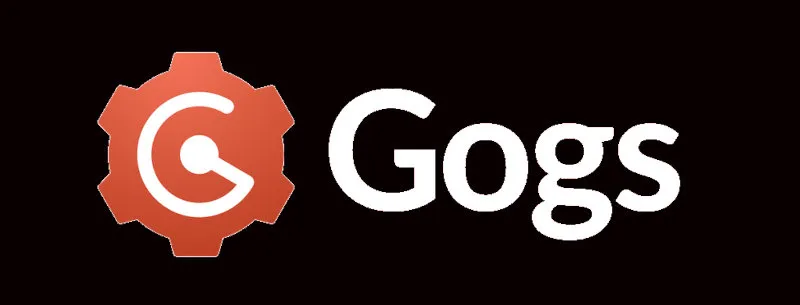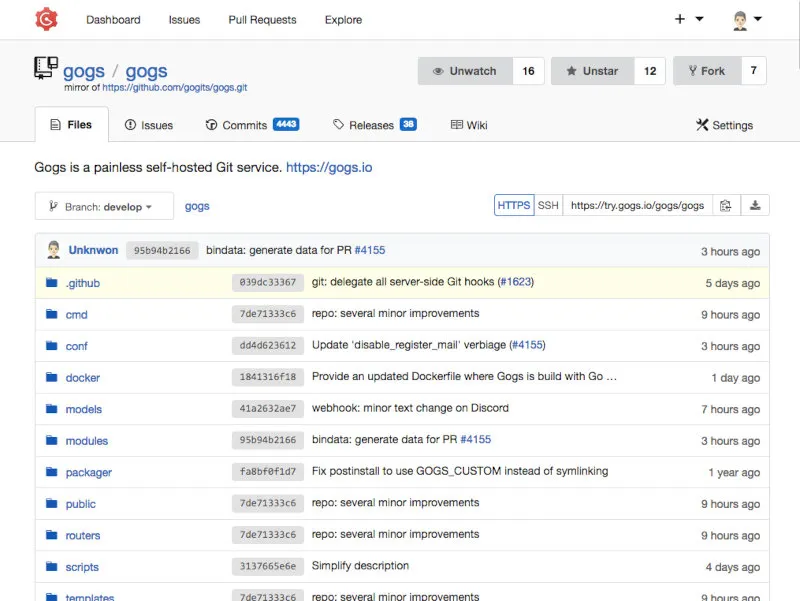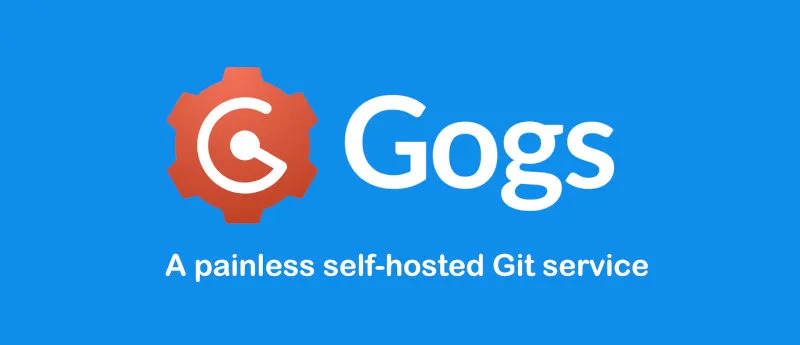
Gogs: The Original Minimalist Git Service
Table of Contents
- Key Features at a Glance
- The Gogs Philosophy: Who Is It For?
- GitHub vs. Gogs: A Quick Comparison
- Pros and Cons
- Getting Started & Further Reading
- Frequently Asked Questions
- Conclusion
Before there was Gitea, there was Gogs (Go Git Service). Gogs is the pioneering open-source project that proved a powerful, self-hosted Git service could be delivered in a single, lightweight binary. Written in Go, its mission was, and remains, to be “a painless self-hosted Git service.” It’s the spiritual ancestor to a new generation of efficient Git tools.
Gogs focuses on one thing and does it with extreme discipline: providing the core features of a Git server with the lowest possible resource consumption and the simplest possible setup. It’s a masterpiece of minimalism and the project from which the popular Gitea was forked.
Key Features at a Glance

Gogs deliberately keeps its feature set focused on the essentials to maintain its simplicity and performance.
| Feature | Description | Key Benefit |
|---|---|---|
| Absolute Simplicity | Written in Go and compiled to a single binary with no runtime dependencies. | Can be installed and run on virtually any platform (Windows, macOS, Linux, ARM) in minutes with minimal configuration. |
| Extremely Low Resource Usage | Famously requires very little RAM or CPU power to operate. | The perfect choice for running on very cheap hardware, including older machines, a Raspberry Pi, or NAS devices. |
| Core Collaboration Tools | Provides essential repository hosting, issue tracking, and pull request functionality in a clean web UI. | Covers the fundamental needs for individual developers or small teams to collaborate on code without any unnecessary bloat. |
| SSH, HTTP/S Support | Offers standard Git protocols for interacting with repositories, including built-in SSH server support. | Provides a familiar and secure way for developers to clone, fetch, and push code using standard Git clients. |
The Gogs Philosophy: Who Is It For?
The philosophy of Gogs is uncompromising minimalism. It is not in a feature race with other platforms. Instead, it prioritizes stability, simplicity, and a small footprint above all else. Its development is guided by a single lead maintainer, ensuring a consistent and focused vision.
This makes it an ideal choice for:
The Purist: Developers who want a Git server that does its job and nothing more. No CI/CD, no package registries, just Git.
Embedded and Low-Power Systems: Its incredibly low resource usage makes it one of the few viable options for running on hardware with limited memory and CPU.
Personal Projects: An excellent way to host your own code on a home server or NAS device without dedicating significant resources to it.
Users Who Value Stability Over Features: The slower, more deliberate development pace means less churn and a highly stable core product.
GitHub vs. Gogs: A Quick Comparison

This comparison highlights the vast difference in scale, scope, and philosophy.
| Aspect | GitHub | Gogs |
|---|---|---|
| Primary Focus | A global DevOps platform with a massive community. | The simplest possible self-hosted Git server. |
| Hosting Options | Cloud (SaaS) and Self-hosted (Enterprise). | Self-hosted only. |
| Feature Scope | Expansive: CI/CD, packages, security scanning, etc. | Minimalist: Repository hosting and basic collaboration tools. |
| Development Model | Massive corporate engineering team. | Single lead maintainer with community contributions. |
Pros and Cons
Why You Might Choose Gogs
The Lightest of the Lightweights: Gogs is renowned for its minuscule resource footprint, arguably even more so than its descendants.
Unmatched Simplicity of Installation: If you can download a file and execute it from the command line, you can install Gogs.
Focused and Stable: It does its core job extremely well and doesn’t change rapidly, making it a reliable and predictable tool.
Clean, Uncluttered Interface: The UI provides the essentials without any distracting or complex elements.
Potential Drawbacks

Slower Feature Development: This is the main trade-off. Gogs lacks the modern features that have been added to its fork, Gitea, such as integrated CI/CD, a container registry, and package management.
Smaller Community and Support: The community is smaller and less active than Gitea’s, which was forked in part to allow for a more open, community-driven governance model.
“The Gitea Factor”: For most users today, Gitea offers a more compelling package, providing a similar lightweight experience but with a much richer feature set and more active community development.
Single-Maintainer Model: While this ensures a consistent vision, it also presents a risk. The project’s health is heavily dependent on a single individual.
Getting Started & Further Reading
Ready to try the original painless Git service? Explore Gogs with these official links.
Official Website: https://gogs.io/
Documentation: https://gogs.io/docs
GitHub Repository (for code and issues): https://github.com/gogs/gogs
Live Demo: https://try.gogs.io/
Frequently Asked Questions
Q: Is Gogs completely free to use?
A: Yes, Gogs is 100% free and open-source under the MIT license. There are no paid tiers or subscriptions, as it is designed for self-hosting.
Q: How does Gogs compare to Gitea?
A: Gogs is the original project from which Gitea was forked. Gitea offers more modern features like CI/CD and package registries, with a larger community and faster development pace. Gogs remains simpler and lighter, prioritizing minimalism and stability over feature richness.
Q: Can Gogs run on a Raspberry Pi?
A: Absolutely. Gogs’ low resource usage makes it an excellent choice for running on a Raspberry Pi or other low-power devices. The official documentation provides specific guidance for ARM-based installations.
Q: Does Gogs support migrating repositories from GitHub?
A: Yes, Gogs supports repository migration from GitHub using standard Git commands (e.g., git clone --mirror and git push --mirror). However, it lacks a built-in GUI importer like some other platforms.
Q: What kind of support is available for Gogs?
A: Gogs relies on community support through its GitHub repository and forums. Since it has a single maintainer, updates and responses may be slower compared to projects with larger teams or more active communities.
Conclusion
Gogs is a landmark project in the history of Git hosting. It set the standard for what a lightweight, easy-to-use self-hosted Git server could be. While its own fork, Gitea, has since surpassed it in features and community size, Gogs remains a perfectly valid and respectable choice for the minimalist purist. If you need the absolute simplest, most resource-efficient Git server and have no need for modern DevOps bells and whistles, Gogs is a stable, elegant, and timeless solution.